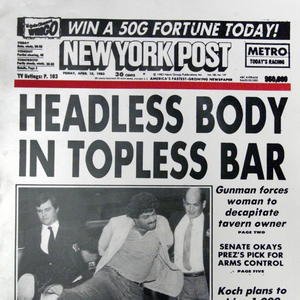
Back in my very early days as a journalist, the daily newspaper I worked for held informal, internal headline writing contests, and I’m happy to say that I won more than my fair share. A “look back” article on the newspaper’s website this past weekend reminded me what a really special headline can do: Last in your memory for nearly 25 years.
My former colleagues still talk today on Facebook about one special headline. In 1990, the Connecticut Huskies were far from producing the national championship basketball teams of today. In fact, that year’s team had taken the Huskies farther than ever before. So when Tate George took a 94-foot inbound pass from Scotty Burrell and swished it in at the buzzer to propel the Huskies forward in the NCAA Tournament, it was special, the kind of shot you never forget.
Today, the headline would have been: George, UConn Sink Clemson at Buzzer
But back then, we weren’t competing for hits, but rather for copy sales and print advertising dollars. After a game like that, there was no doubt that every newspaper that was printed would be sold—there might even be hoarding, the victory was that special to the people of Connecticut.
So did the headline really matter? To us, it did. The headline that my colleague wrote (and quite a few people collaborated on): It’s Late, It’s Tate, It’s Great!
Comparing the actual and the SEO-friendly headlines, a question keeps nagging me: Has our quest for SEO sucked all the fun out of writing clever headline for our articles and blogs? The answer is yes…but only if you let it.
Let’s face it, it takes no special talent to write a headline that says “George, UConn Sink Clemson at Buzzer.” However, today, an article with that headline will likely be read more than the other because it will be found more by search engines. And articles that get more eyeballs drive more revenue, etc., etc., and so on.
So how can content marketers today please the SEO gods while using their creative juices as much as possible? Here are four tips for making the most of your content through your headline:
1) Realize the Value of SEO: Let’s face it, without SEO, many of your articles and blog posts may never be found and read.So put away the pride and find ways to work with SEO creatively instead of moaning about it at every turn.
2) Know your keywords: In the example above, UConn is clearly the main keyword. Huskies, while nice, ranks behind the dog breed in Google search rankings and regularly competes with the University of Washington and Northeastern University for “top dog.”
3) Incorporate emotion: Wait, what? Yes, you can incorporate emotion into your headlines and still get the SEO you’re looking for. Look above at the original headline from 1990. “It’s Great” was revolutionary in a day when sports editors were told they needed to maintain neutrality. “It’s Great,” however, captured the emotion the state was feeling over the Huskies’ win. If your keywords help people find your article, emotion may help them click on it.
4) Keep things natural: Using strange or awkward headlines to optimize SEO not only feels unnatural to you, but seems fake to your audience as well.Much as you would look for ways in the article body to insert searchable words and phrases, do the same for your headline.
What would the 1990 headline look like incorporating the tips above? Probably something like “It’s Late, It’s Great: Tate’s Buzzer-Beater Pushes UConn Past Clemson.” How would you have written it differently?
[Photo courtesy www.minternetmarketing.com]
